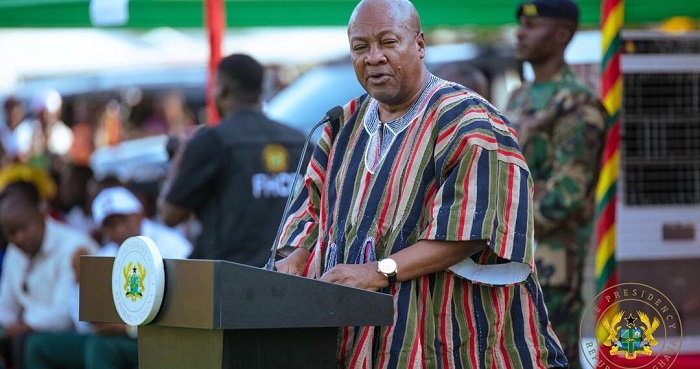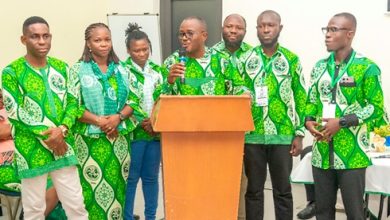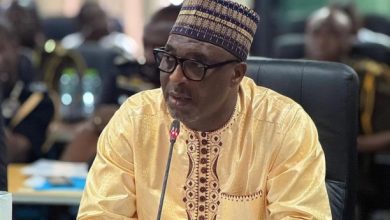President Mahama unveils 2025 development package for Savannah
President Mahama unveils 2025 development package for Savannah: University, hospital, water and roads top list

President John Dramani Mahama has announced a new development plan for the Savannah Region, outlining a set of projects he says will begin in 2025.
The plan includes the construction of a public university, a regional hospital, a water supply system for Damongo, and the rehabilitation of several road networks across the region.
President Mahama announced on Saturday, June 14, 2025, during a stop at the forecourt of the Yagbonwura’s Palace in Damongo as part of his ‘Thank You’ tour of the area.
He said the series of interventions represents a practical response to longstanding regional disparities, particularly in access to education, water, healthcare, and transport.
“This is more than a thank you,” he told a crowd of traditional leaders, residents, and officials. “It is a renewal of trust, a renewal of shared purpose.”
President Mahama said his government would not dwell on excuses but would work to meet the everyday needs of people in the region.
University for agricultural training
One of the central features of the announcement is the establishment of a public university in the Savannah Region. The institution will focus on agriculture and related sciences, and is expected to support the government’s Feed Ghana initiative and its broader plan for economic development through agriculture.
According to President Mahama, funding for the new university has been captured in the 2025 budget. He added that the institution would contribute to skills development and expand access to higher education in one of the country’s newest regions.
“This university will not just be symbolic,” he said. “It will be grounded in our national plan for skills and education.”
Clean water for Damongo residents
President Mahama confirmed that the Damongo water supply project, which had faced several delays, would proceed this year. The project will draw water from the White Volta at Yapei and provide clean drinking water to over 8,000 residents in Damongo and other communities along the supply route.
He disclosed that the European Union has agreed to finance the project. The necessary designs, he said, are complete and ready for execution.
Regional hospital and sports stadium
The President also announced that a new regional hospital would be built in Damongo. This forms part of a broader plan to build regional hospitals in each of the six newly created regions.
In addition, a new sports stadium will be constructed in Damongo to support youth activities and sporting events. These two projects, Mr Mahama said, are part of a broader effort to upgrade public services in the region.
Roads to link farms, towns and markets
Road infrastructure remains a major concern for many residents in the Savannah Region. Mr Mahama stated that the Damongo-Fufulso-Sawla road, which saw some upgrades during his previous administration, would undergo further repairs this year. He said attention would be given to the deteriorated section between Damongo and Sawla.
He also announced work on the Tinga-Busunu road, saying procurement processes had already started. Other road projects mentioned include the Bole-Chache road, town roads in Bole, and several feeder roads and bridges in areas such as Daboya, Busunu, Yapei, and Bipe.
Mr Mahama added that bridges considered structurally weak would be replaced, and new roads would be constructed to link central Gonja to Salaga North and Salaga South districts. Roads such as the Yapei-Salaga stretch, Kusawgu-Pingjipe, and routes from Kpembe and Adape would also receive attention.
Technical and teacher training expansion
In the education sector, Mr Mahama announced that a STEM senior high school will be established in Tinga, in the Bole District, while a vocational training centre will be set up in Salaga. The centre will provide hands-on training in areas such as ICT, construction, green technologies, and agribusiness.
He also said the Savannah College of Education in Daboya, which had previously been a private community initiative, has now been absorbed as a public teacher training institution. The Ghana Tertiary Education Commission and GETFund, he noted, have been directed to fast-track recruitment and infrastructure development at the college.
Construction work will also resume at the abandoned College of Education at Doli, near Bole, which began under Mr Mahama’s earlier administration.
“We are here to work for the farmer in Daboya, the teacher in Bole, the nurse in Salaga, and the student in Damongo,” he said.
Local representation and governance
Mr Mahama drew attention to the number of residents from the Savannah Region who now hold public office. These include ministers, heads of agencies, board members, and ambassadors.
He described their appointments as part of an effort to ensure the region has a voice in national decision-making.
“No region, no district, no community will be left behind,” he said.



